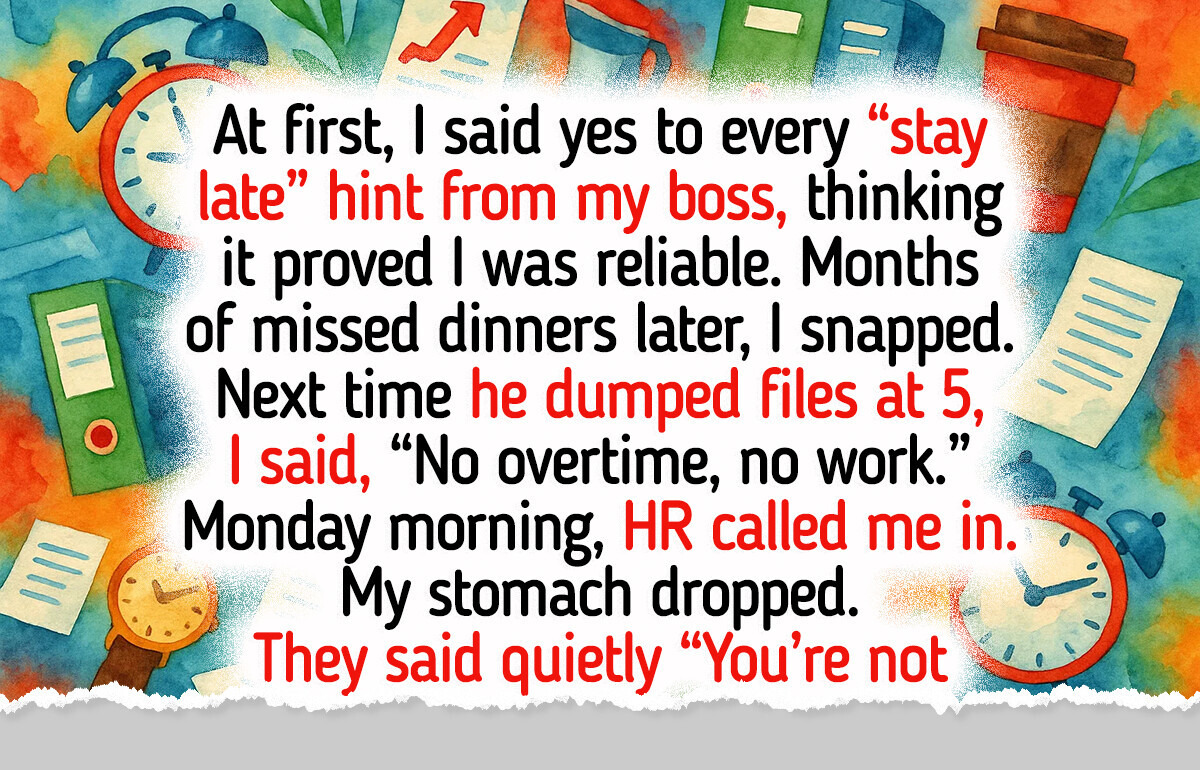Good for you you need your time to.
My Boss Reported Me to HR for Refusing to Work for Free — I Got Revenge

Most of us are told that working late without extra pay makes us a “team player.” But here’s the truth — saying yes to free overtime doesn’t just drain your energy, it teaches others to take advantage of you.
One of our readers faced this exact situation. When she finally drew the line and refused to work overtime for free, her boss didn’t take it well. In fact, he marched straight to HR to make her look like the problem.
The letter:
Dear Bright Side,
When I first started at my job, I thought saying “yes” to everything was the way to prove myself. My manager took full advantage. He never told me to stay late — he’d just linger at my desk at 5:00 and casually drop, “This needs to be wrapped up before morning.” I wanted to seem reliable, so I kept doing it. Weeks turned into months of missed dinners, cold takeout at my desk, and stumbling home close to midnight.
The breaking point came when I skipped my best friend’s engagement party because of a “last-minute” report. That night I realized: nobody at work even noticed my sacrifices. They assumed I’d always cave.
So the next time he cornered me — 5:03 p.m., files stacked like a tower — I looked him dead in the eye and said, “No. Not unless you’re paying me overtime.” He raised an eyebrow, muttered something about “attitude,” and walked away. I spent the entire weekend convinced I’d signed my own resignation.
On Monday morning, HR called me in after my boss told them about the conflict. My stomach dropped. But instead of a lecture, they asked me to describe what had been happening. I told them everything — the pressure, the unpaid hours, how it was expected of me alone. They said quietly, “You’re not the first to bring this up.”
The fallout? My boss wasn’t fired, but he was forced to log overtime for any “requests” after hours. And not just for me — HR rolled it out to the whole team. The look on his face when he announced it in the next staff meeting was priceless.
Funny thing: all it took was one “no” to flip the whole script.
Nicole
Thank you for sharing your story with us, Nicole. We know how hard it can be to stand up for yourself at work, but your decision to say just one simple ‘no’ shows how powerful boundaries can be. Your courage is inspiring, and we’re certain your experience will help others find their own voice too.
How to Say No to Your Boss and Set Healthy Boundaries at Work

Most of us grew up believing: “Never say no to your boss.” But here’s the truth — always saying yes can quietly wreck your career. It drains your energy, scatters your focus, and ironically makes you less dependable.
So how do you set limits without sparking drama in the office? Here are some smart, respectful — and surprisingly effective — ways to say no while keeping your professionalism intact.
Why “Yes” Isn’t Always the Safe Answer
At first, saying yes feels like the easy way out. No conflict, no awkwardness. But the weight builds up: extra projects, late nights, missed weekends. Eventually, something slips — and instead of seeing a team player, your boss sees someone unreliable.
That’s why learning to say no the right way doesn’t make you difficult. It makes you stronger, clearer, and more trustworthy.
“The difference between successful people and really successful people is that really successful people say no to almost everything.”
— Warren Buffett

Clever Ways to Protect Your Time (Without Using the Word “No”)
Saying “no” doesn’t have to sound harsh. With the right phrasing, you can protect your time and keep things professional:
Instead of flatly rejecting, try:
👉 “I can take this on, but it’ll push back Project A. Which matters more right now?”
Instead of a hard refusal, try:
👉 “I’d love to help. Can we shift the deadline so I can give it my full attention?”
Instead of “That’s too much,” try:
👉 “That’s a big task — let’s focus on the outcome that matters most.”
Each response sets limits while showing teamwork.
Your Boundaries Are Like Guardrails
If you don’t set them early, people will keep moving the line. Here are some examples to inspire you:
💬 Communication → Replies during work hours only, not at 11 p.m.
📅 Time → Weekends are sacred rest days.
❤️ Respect → Critique my work, not me as a person.
Think of boundaries as invisible guardrails: they keep you safe, steady, and moving forward in the right direction.
Saying no doesn’t make you lazy or ungrateful. It makes you human — and smart. The best employees aren’t the ones who sacrifice everything. They’re the ones who know their value and protect it.
20 People Who Proved That the Kindest Hearts Wear the Strongest Armor
Comments
If that extra work is always an emergency you have an incompetent manager. Time to work to rule. Never work for free in a for-profit business.
Turn them in to the labor board and they will be audited for 10 years to see who else they did this to and will be find. Find a labor attorney and he will help.
So basically what I’m reading is that the boss got away with everything. His punishment was basically “do what you were originally meant to do in this scenario from now on.”
Related Reads
10 Times Being Kind Changed the Story More Than Being Right

I Refused to Let My DIL Treat Me as Her Personal Chef—She Wasn’t Ready for My Wake-Up Call

12 Times Blended Families Learned That Love Doesn’t Need DNA

15 Strangers Who Made an Ordinary Day Unforgettable

10 True Stories With Endings So Wild, Hollywood Couldn’t Write Them Better

15 Times Kindness Showed Up Exactly When It Was Needed

I Refused to Talk to My Parents After They Chose My Ex-Wife Over Me

I Refused to Let My Sister Make My Wedding About Her Miscarriage—So I Exposed Her Dark Secret

I Lost a $120K Job Over a Ridiculous Interview Test

I Refuse to Keep Visiting My Husband’s Family—I’m the Breadwinner, Not Him

15+ People Who Went Shopping for Clothes and Ended Up Starring in Their Own Personal Sitcom

My Parents Refused to Fund My Education, So I Turned the Tables on Them
